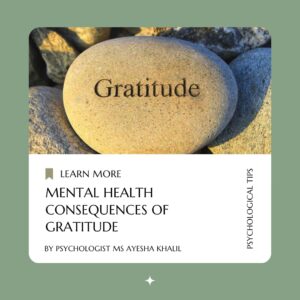Gratitude

Mental Health Consequences of Gratitude
The topic can be explained as a relatively straightforward but powerful psychological phenomenon, namely gratitude encompasses focusing on the positive side of life. According to the findings, the practice of gratitude acts as a way of improving psychological wellbeing, as well as, mental health.
Appreciation works towards changing a person’s attitude to one of counting gains rather than losses. It can help decrease symptoms of the depression and anxiety by replacing negative thinking patterns. Research has also shown that there is a correlation between stress levels and practising gratitude and self reported satisfaction with life.
It is suggested that social relationships are some among the strong ways that gratitude directly boost mental health. Gratitude helps people feel closer to one another and to promote feelings of trust, warmth and support. Such cohesion can play a protective role relating to stress and can help foster affiliation.
Neuroscience also has positive findings about the biological effects of gratitude. Gratitude exercises their brain reward system and the release of dopamine and serotonin, neurotransmitters, which predispose to well-being. Also, many studies claim that gratitude is key in lowering physiological stress – cortisol, a stress hormone, is found to be lower among those who are grateful.
Introducing gratitude into daily functioning is actually quite easy to do. Examples of cultivating habits of gratitude include using a diary, where people write down things they are thankful for, or people telling their loved one thank you. It is also necessary to remember that many techniques of mindfulness also help develop appreciable abilities, such as practicing on the gratitude of positive experiences.
Altogether it can be noted that gratitude is a serious kind of the psychological weapon, which can influence people’s mental state and change them for the better. Being able to embrace the good things in life, improve interpersonal bonds and increase brain activity grants gratitude the power to make us emotionally strong. Due to its ease and efficiency, it has become one of the most beneficial practices any person with mental health issues could engage in.
